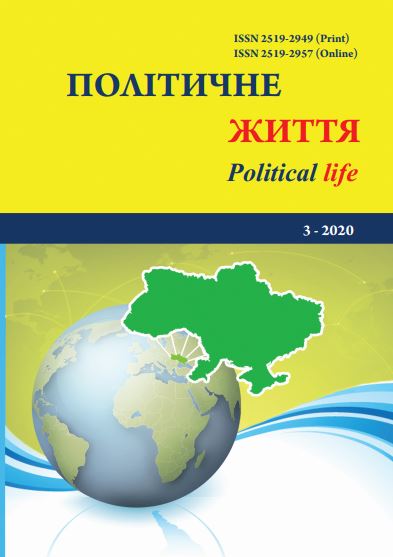Public broadcasting in the Baltic States during the restoration of statehood
DOI:
https://doi.org/10.31558/2519-2949.2020.3.7Keywords:
public broadcasting; post-communist media; restoration of statehood; democracy; informational spaceAbstract
The article examines the features of public broadcasting in the Baltic States during the restoration of statehood. It is emphasized that the conditions of post-communist development have significantly influenced the media system and its information policy. The definitions of the "public broadcasting" concept and its main meanings are analyzed. The peculiarities of the development and formation of public broadcasting in the post-communist countries, which have created certain cases for further improvement of state policy on the media, are traced. The structure of a special institution to which the state broadcasters of the Baltic States are subordinated is considered. Emphasis is placed on financing state television and radio companies. The main features of the program policy in accordance with the national legislation are indicated.
The study proved that the information policy of public broadcasting is significantly influenced by geopolitical and cultural factors that contribute to the coverage of the pluralism of opinions of the ethnic composition of the population. The liberalization of socio-political life leads to the fact that one of the main responsibilities of public service broadcasting in the Baltic States is to ensure the unhindered dissemination of comprehensive coverage of events in the country and abroad. The internationalization of the Baltic media by Western companies contributes to their Westernization and development in accordance with European principles.
In the course of the research it was determined that the formation of public broadcasting in the Baltic States is due to the integration of political, cultural and historical determinants. A feature of the informational space of the Baltic States is bilingualism, which contributes to the democratization of society and the development of the media. It is proved that the democratic development of the state requires the functioning of public television and radio, which provide coverage of information taking into account the social, cultural, religious and other diversity of the population.
References
Джолос О. В. Засади організації та функціонування суспільного телерадіомовлення: європейський досвід. Наукові записки Інституту журналістики. 2015. Т. 61. С. 55-61.
Європейські стандарти у галузі суспільного мовлення / за ред. Т.С. Шевченка, О.А. Сушко. К., 2010. 264 с.
Іванов Д. В. Суспільне мовлення: поняття та призначення для людини, суспільства, демократії. Європейські перспективи. 2013. № 4. С. 79–83.
Ковальчук О.І. Суспільне мовлення в інформаційній парадигмі «третьої хвилі»:порівняльно-правовий аспект. Форум права. 2014. № 1. С. 248–253 .
Кострубіцька А. В. Державне регулювання суспільного мовлення: європейський досвід та українські реалії. Держава та регіони. Сер. Держ. упр. 2014. Вип. 3. С.20–24.
Рекомендація N R (96) 10 Комітету міністрів Ради Європи державам-учасницям стосовно гарантій незалежності суспільного мовлення. URL: https://zakon.rada.gov.ua/laws/show/994_094#Text. (дата звернення: 25.08.2020).
Симонян Р.Х. Балтийские масс-медиа: динамика последнего десятилетия Социологические исследования. 2004. № 2. С. 98-105. URL: http://ecsocman.hse.ru/data/971/383/1217/013.SIMONIAN.pdf (дата звернення: 25.08.2020).
Хантингтон С. Столкновение цивилизаций. М.: АСТ, 2005. 603с.
Richter A. Post-soviet perspective on censorship and freedom of the media. Moscow : UNESCO Office Moscow, 2007. 325р. URL: phttps://unesdoc.unesco.org/ark:/48223/pf0000153744. (дата звернення: 25.08.2020).
Rožukalne A. From PBS to PSM: The Shape of „New” Public Media in the Baltic States URL: http://ripeat.org/library/Rozukalne%20paper%202012.pdf. (дата звернення: 25.08.2020).

